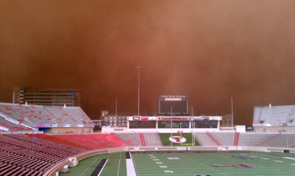WASHINGTON, Oct. 20- A massive dust storm that hit Lubbock, Texas on Monday arrived during widespread drought in the southern plains and discussions of significant budget cuts to Farm Bill spending in Washington.
The dust storm descends upon the Texas Tech football stadium in this photo. The storm reached wind speeds recorded up to 75 mph, according to the National Oceanic and Atmospheric Administration.

In August, Oklahoma Association of Conservation Districts Executive Director Clay Pope issued a reminder that conservation tactics and programs utilized by farmers and ranchers are what prevent this drought from turning into another dust bowl reminiscent of the 1930’s. The dust storm on Monday may serve as a timely reminder about the impact conservation has on maintaining topsoil. Pope said in his statement that these dust storms are rare due in part to federal investments in conservation. The following includes part of that written address titled, “Thank a Farmer”:
“We must stay vigilant and not repeat the mistakes of the past. The state and federal governments must maintain their commitment to conserving our natural resources and properly fund conservation. Cuts currently being proposed to USDA NRCS in Washington should be carefully examined to make sure that we aren’t setting ourselves up for a repeat of past problems during this time of tight federal budgets.”
“Surely this year, now identified as one of the driest in Oklahoma history, we should again be seeing massive dust storms. The difference is the changes in agriculture that grew out of the dust bowl. Changes resulting largely from the partnership between landowners, local Conservation Districts and the state and federal governments, especially the Oklahoma Conservation Commission and the USDA Natural Resource Conservation Service (NRCS).”
“We should also recognize that we have new challenges such as water quality concerns and the spread of invasive species like the eastern redcedar, challenges that can be addressed the same way we attacked the dust bowl, through voluntary, locally-led means. By working together we can conserve our natural resources without new regulations.”
#30
For more news, go to www.agri-pulse.com
